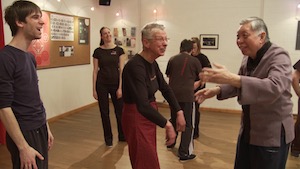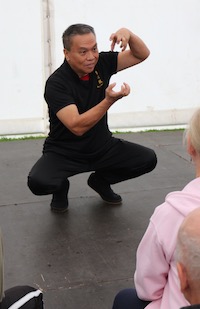Ways to learn Qigong and Taijiquan part 3:
Workshops – Holidays – Seminars
There are many ways to learn Qigong and Taijiquan.
We have considered the pros and cons of some:
Learning in Workshops – Week-end courses and seminars

Especially concerning Qigong, workshops are ideal to get to know new short sets, like e.g. the 8 Brocades or the 5 animals. Also, the choreography of loosening and softening exercises can be learned quickly enough to still memorize them when continuing home practise.
In Taijiquan it is often required to know (part of) the form already before going to a workshop which covers form corrections or form application. Contrary to style-dependent form (correction) workshops, workshops with applications or other partner exercises often follow their own – less complicated and less style-oriented – patterns. Thus, a week-end course might be a great opportunity to (re)discover Taijiquan as an art of body communication or even as a martial art by exploring e.g. forms of stepping, new Pushing Hands (Tui shou) patterns and the like.
PRO:
- For beginners learning in Workshops is a great way to try out a new style or a new teaching system. You might look out for taster workshops in your area if you want to (re)orientate your training.
- Workshops contain condensed information. Some more detailed questions cannot be dealt with in regular courses. So, if you are getting familiar with your system, in-depth workshops are a great opportunity to get deeper insights into the art as an advanced practitioner.
- If you are not one of the lucky few who have a high-quality teacher of your style in the neighbourhood, workshops are the best – or even sometimes the only – option to enhance your skills at a higher level.
CON:
- If workshops are your only way of training or getting corrections or instructions, you may end up by just scratching the surface. Even if you want to follow the path of a more gymnastically orientated Health Qigong, using workshops and seminars as intensive training complementing your regular classes would be the ideal way for the first years.
- Also for the advanced practitioners, there are many exciting workshop offers out there, which may present aspects of your training that you were missing or techniques that you may want to learn in the search for development or completeness. Trying to catch new information or collecting Qigong sets, Taijiquan forms or Push Hands approaches from different teachers is fun! But if you hop from one workshop to the other, collecting a bunch of wonderful flowers, beware of the danger of never getting into the finer aspects of the art!
- The Taiji principles and the philosophical and cultural foundations may be similar, and the words used may sound familiar to you… – but: Really grasping the meaning of the teaching, the specific instructions and the corrections, i.e. getting beyond the choreography into the body mechanics of a Qigong or Taijiquan style will take years with the same teacher.
TIPP: If you have decided which approach you like best, commit yourself to it and lay a decent foundation – meaning several years of training in a system – upon which you can build. For the beginning, it may be of help to choose workshops which are related to your own system, but even then, the differences lay in the details.
Block seminars/Qigong and Taijiquan holidays
Qigong on the beach, Taijiquan at “original” or “authentic” places – there is a wealth of offers which draw the picture of a productive yet relaxing holiday.
PRO:
- If you want to learn a new form or really work on yourself, a week-end might not be enough. So why not combine relaxation in movement with the relaxing atmosphere of a holiday? Sounds perfect!
CON:
- “And now I am going to relax!” – Do not fit your well-being into a corner of your life. Your well-being, health and self-development is influenced much more by the way you organize your daily activities and weekly hobbies than by the programme of your holidays and wellness days in a spa.
- Exercising very much in a small space of time may feel effective and empowering while doing it, but the transformations in Qigong and Taijiquan are slow. Moreover, it is this slowness that makes them effective and sustainable in the long run. Intensive training is fine, but remember: You cannot force progress.
- The real trick is to relax in the middle of a storm, not in the middle of nowhere. – Changes that you undergo in your “Qi holidays” will have to prove their worth later, when you take up work again and go back to your family and friends.
- If you plan on making intensive sessions your only supervised training, you will have to know your basics first. As a way of training organisation, intensive training once or twice a year is not advisable for beginners.
Ways to learn Qigong and Taijiquan
Part 1: Weekly courses
Part 2: DVDs, videos and online-programmes
Part 3: Workshops – Weekend courses
Part 4: Workshops – Exchange meetings
Author: Taiji-Forum
Images: Taiji-Forum

